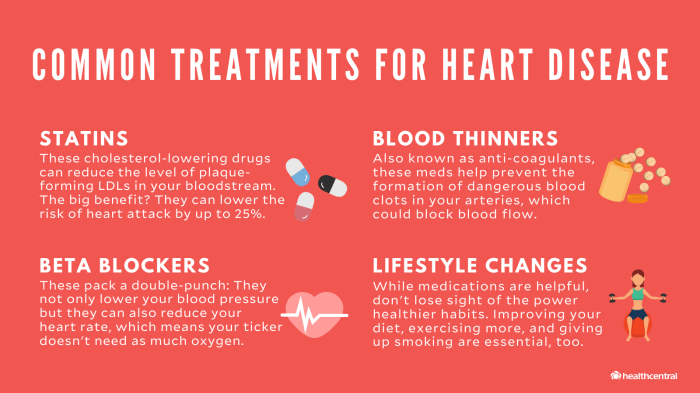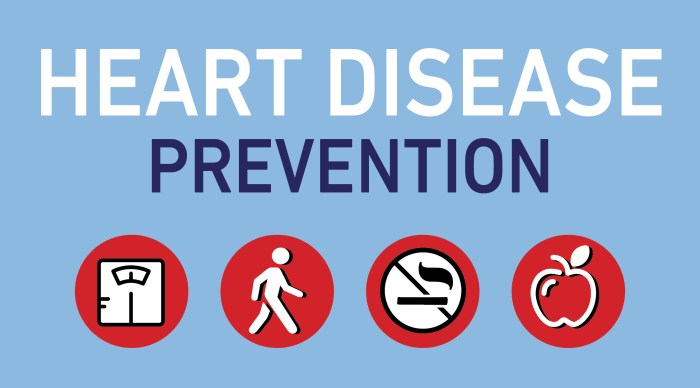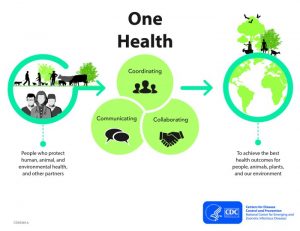
Exploring the realm of Preventive health solutions for heart disease, this guide aims to shed light on the crucial strategies that can help individuals safeguard their heart health. From lifestyle changes to medical interventions, this topic delves into the multifaceted approach towards preventing heart disease.
Preventive Health Solutions for Heart Disease

Preventive health measures play a crucial role in reducing the risk of heart disease. By adopting a healthy lifestyle and making conscious choices, individuals can significantly lower their chances of developing heart-related issues.
Examples of Lifestyle Changes
- Quit smoking: Smoking is a major risk factor for heart disease. By quitting smoking, individuals can improve their heart health and reduce the risk of cardiovascular problems.
- Healthy diet: Consuming a diet rich in fruits, vegetables, whole grains, and lean proteins can help maintain a healthy heart. Avoiding processed foods and excessive salt and sugar intake is also beneficial.
- Manage stress: Chronic stress can contribute to heart disease. Engaging in stress-reducing activities such as meditation, yoga, or spending time with loved ones can have a positive impact on heart health.
Role of Regular Exercise
Regular exercise is essential for maintaining heart health. Physical activity helps strengthen the heart muscle, improve blood circulation, and lower blood pressure. Aim for at least 150 minutes of moderate-intensity exercise per week to keep your heart in top shape.
Impact of a Healthy Diet
A healthy diet plays a significant role in preventing heart disease. Consuming foods rich in antioxidants, omega-3 fatty acids, and fiber can help reduce inflammation, lower cholesterol levels, and improve overall heart function. Incorporate plenty of fruits, vegetables, nuts, and seeds into your diet for optimal heart health.
Healthcare Services for Heart Disease Prevention
Regular healthcare services play a crucial role in preventing heart disease by providing early detection and monitoring of heart health. These services encompass a range of screenings, check-ups, and consultations with healthcare providers to ensure optimal heart health.
Role of Screenings and Check-ups
Regular screenings and check-ups are essential for the early detection of risk factors and potential heart issues. These may include blood pressure checks, cholesterol screenings, and electrocardiograms to assess heart function and identify any abnormalities. By detecting problems early on, individuals can take proactive steps to prevent the progression of heart disease.
Importance of Regular Visits to Healthcare Providers
Regular visits to healthcare providers are vital for ongoing monitoring of heart health. Healthcare professionals can assess risk factors, provide guidance on lifestyle changes, and recommend appropriate interventions to prevent heart disease. These visits also allow for the management of existing conditions such as hypertension or diabetes, which can contribute to heart issues if left uncontrolled.
Medical Care for Heart Disease Prevention
Regular medical care is essential for individuals at risk of heart disease to manage their condition effectively. This includes various treatments and interventions to prevent complications and improve heart health.
Medication Adherence in Managing Heart Health
Adherence to prescribed medications is crucial in managing heart health and preventing further complications. Medications such as statins, beta-blockers, and blood thinners help control blood pressure, cholesterol levels, and reduce the risk of blood clots.
- It is important to take medications as prescribed by healthcare providers to ensure their effectiveness in managing heart disease.
- Skipping doses or stopping medication abruptly can lead to worsening symptoms and increased risk of heart-related events.
- Patients should communicate any concerns or side effects to their healthcare team to find alternative solutions or adjust the treatment plan accordingly.
Role of Surgical Interventions in Preventing Complications
Surgical interventions play a crucial role in preventing complications related to heart disease, especially in cases where medications and lifestyle changes are not sufficient to manage the condition.
- Procedures such as angioplasty, stent placement, and bypass surgery help restore blood flow to the heart muscles, reducing the risk of heart attacks and other cardiovascular events.
- Surgical interventions are recommended based on the individual’s specific condition, risk factors, and overall health status.
- Close monitoring and follow-up care are essential after surgical interventions to ensure proper healing and long-term success in preventing complications.
Health Insurance Coverage for Heart Disease Prevention
Health insurance plays a crucial role in accessing preventive care for heart disease, as it helps individuals afford necessary screenings, treatments, and medications to maintain heart health.
Types of Health Insurance Plans for Heart Disease Prevention
- Private Health Insurance: Many private insurance companies offer plans that cover preventive services for heart disease, including annual check-ups, cholesterol screenings, and blood pressure monitoring.
- Medicare: Medicare Part B covers cardiovascular screenings, such as blood pressure checks and cholesterol tests, as well as counseling to help individuals maintain a healthy lifestyle.
- Medicaid: Individuals with low income may qualify for Medicaid, which covers a range of preventive services for heart disease, ensuring access to necessary care.
Utilizing Health Insurance for Preventive Screenings and Treatments
When utilizing health insurance for preventive screenings and treatments related to heart health, individuals should follow these steps:
- Schedule regular check-ups with a primary care physician to assess heart health and discuss any concerns.
- Verify coverage with the insurance provider to ensure that preventive services for heart disease are included in the plan.
- Follow the recommended screening guidelines for heart disease prevention, such as cholesterol screenings, blood pressure checks, and diabetes testing.
- Consult with healthcare providers to develop a personalized prevention plan based on individual risk factors and health goals.
- Submit claims for preventive services as directed by the insurance provider to receive coverage for screenings and treatments.
Medical Research in Heart Disease Prevention
Medical research plays a crucial role in developing new strategies for preventing heart disease. By studying risk factors, treatment options, and lifestyle interventions, researchers can discover innovative ways to improve heart health and reduce the incidence of cardiovascular issues.
Recent Advancements in Medical Research for Heart Disease Prevention
- Genetic studies have identified specific gene variants associated with an increased risk of heart disease, allowing for targeted interventions and personalized treatment plans.
- Advancements in imaging technology, such as MRI and CT scans, have enabled early detection of heart issues, leading to timely interventions and improved outcomes.
- Research on the impact of diet and exercise on heart health has provided valuable insights into the importance of lifestyle modifications in preventing cardiovascular diseases.
Application of Research Findings in Clinical Practice
- Findings from medical research are incorporated into clinical guidelines to help healthcare providers make informed decisions about patient care and treatment options.
- New medications and therapies developed through research are prescribed to patients to manage risk factors and prevent heart disease progression.
- Ongoing research studies help healthcare professionals stay updated on the latest advancements in heart disease prevention, ensuring that patients receive the most effective and evidence-based care.
Health Facilities and Clinics for Heart Disease Prevention

Health facilities and clinics play a crucial role in providing specialized services for heart disease prevention.
Services Offered at Health Facilities and Clinics
- Regular health screenings to assess risk factors for heart disease such as blood pressure, cholesterol levels, and BMI.
- Educational programs on lifestyle modifications including diet, exercise, and stress management.
- Access to cardiac specialists for consultation and personalized prevention plans.
- Monitoring and management of chronic conditions that contribute to heart disease risk.
Importance of Specialized Clinics
Specialized clinics are essential in providing comprehensive care for individuals at risk of heart disease by offering tailored prevention strategies and early intervention.
Role of Health Facilities in Promoting Community Awareness
- Organizing community events and workshops to educate the public about heart disease prevention.
- Collaborating with local organizations to reach underserved populations and promote preventive health initiatives.
- Offering resources and support for individuals to make informed decisions about their heart health.
Healthcare Tips for Heart Disease Prevention
Incorporating heart-healthy habits into your daily routine is essential for preventing heart disease. Managing stress levels and ensuring you get enough sleep also play a crucial role in maintaining heart health.
Practical Tips for Heart-Healthy Habits
- Eat a balanced diet rich in fruits, vegetables, whole grains, and lean proteins.
- Engage in regular physical activity, aiming for at least 150 minutes of moderate exercise per week.
- Avoid smoking and limit alcohol intake to reduce your risk of heart disease.
- Maintain a healthy weight to prevent obesity, which is a significant risk factor for heart problems.
- Monitor your blood pressure, cholesterol levels, and blood sugar regularly to catch any potential issues early.
Managing Stress for Heart Health
- Practice relaxation techniques such as deep breathing, meditation, or yoga to reduce stress levels.
- Engage in hobbies or activities you enjoy to unwind and take your mind off stressors.
- Seek support from friends, family, or a therapist if you’re feeling overwhelmed or anxious.
The Significance of Adequate Sleep
- Aim for 7-9 hours of quality sleep per night to allow your body to rest and recover.
- Poor sleep habits can increase your risk of heart disease, so prioritize a consistent sleep schedule.
- Create a relaxing bedtime routine and ensure your sleep environment is conducive to restful sleep.
Health Systems and Heart Disease Prevention
When it comes to heart disease prevention, different health systems around the world have varying approaches to tackling this pervasive health issue. These systems play a crucial role in implementing preventive measures and strategies to address heart disease and improve overall public health.
Comparison of Health Systems in Heart Disease Prevention
Health systems can be compared based on their emphasis on preventive measures for heart disease. Here are some key points to consider:
- Some health systems prioritize primary care and regular screenings to detect risk factors early on.
- Others focus on lifestyle interventions, such as promoting healthy diets and physical activity, to prevent heart disease.
- Certain systems may have specialized programs for high-risk individuals, offering targeted interventions and monitoring.
Integration of Preventive Measures in Healthcare Systems
Effective heart disease prevention requires seamless integration of preventive measures within healthcare systems. This integration involves:
- Training healthcare providers to educate patients on heart-healthy behaviors and risk factors.
- Implementing electronic health records to track and manage preventive care for individuals at risk of heart disease.
- Establishing referral systems for patients to access specialized cardiac care and interventions when needed.
Challenges and Opportunities in Health Systems for Heart Disease Prevention
Health systems face both challenges and opportunities in improving heart disease prevention strategies. Some key points to consider include:
- Challenges such as limited resources, inadequate infrastructure, and disparities in access to preventive care can hinder effective prevention efforts.
- Opportunities lie in leveraging technology for remote monitoring, telemedicine, and personalized healthcare approaches for heart disease prevention.
- Collaboration among healthcare providers, policymakers, and community organizations can enhance the effectiveness of preventive programs and interventions.
Final Thoughts

In conclusion, the journey through Preventive health solutions for heart disease unveils a tapestry of proactive steps that individuals can take to protect their heart health. By understanding the importance of preventive measures and embracing a holistic approach, one can pave the way towards a heart-healthy future.
Commonly Asked Questions
How important are lifestyle changes in preventing heart disease?
Lifestyle changes play a crucial role in reducing the risk of heart disease by promoting healthy habits such as regular exercise and a balanced diet.
What is the significance of regular visits to healthcare providers for heart health monitoring?
Regular visits to healthcare providers are essential for early detection and management of any potential heart issues, ensuring proactive care.
How do health insurance plans impact access to preventive care for heart disease?
Health insurance plans can facilitate access to preventive screenings and treatments related to heart health, making preventive care more affordable and accessible.





